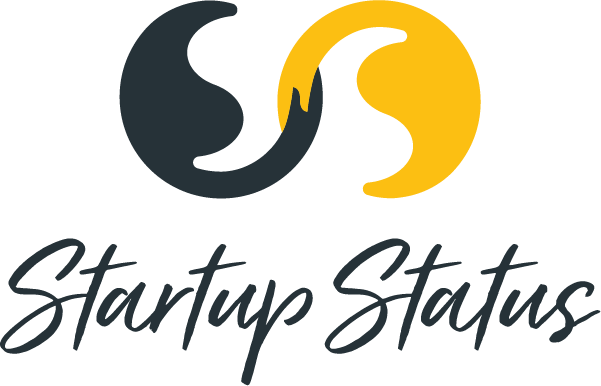Entrepreneurship research matters.
Entrepreneurship helps individual, organisations, and regions. Personal lives can be transformed through building self-belief and providing financial freedom. Entrepreneurs in organisations can develop new opportunities and help navigate disruption that has become commonplace. Entrepreneurship supports regions to diversify their economy, become more globally competitive, and build resilience.
These outcomes are by no means guaranteed. The conditions and process for success is complex for individuals, organisations, and regions. Entrepreneurship research helps make sense of the complexity and provides tools and guidance for policy makers, educators, supporters, and entrepreneurs.
The importance of entrepreneurship research was reinforced when over 150 researchers, practitioners, educators, and policy makers met in Adelaide, Australia for the 17th annual Australian Centre for Entrepreneurship Research Exchange (ACERE).
With a focus on advancing entrepreneurship research, the four-day conference brought together:
- 155 participants from 6 contents,
- 7 keynote speakers and facilitators,
- Over 80 paper presentations on the latest in entrepreneurial research,
- 2 parallel full-day sessions for entrepreneur education (the Entrepreneurship Educator’s Forum) and doctoral students (the Doctoral Consortium), and
- 3 networking events to build relationships across global and organisational boundaries of academia, government, and entrepreneurs.
Thanks to the sponsors including: the Australian Centre for Entrepreneurship Research at QUT Business School, the University of South Australia Business School, Swinburne University, the University of Adelaide, Flinders University New Venture Institute, LaTrobe Business School, and South Australia’s Future Industries Exchange for Entrepreneurship (FIXE).
These are my personal reflections to capture my notes, share with those who may have missed out, and connect with others keen to make a difference.
Creating the future for entrepreneur education and research
The first day of the conference provided parallel streams for entrepreneur education and doctoral students.
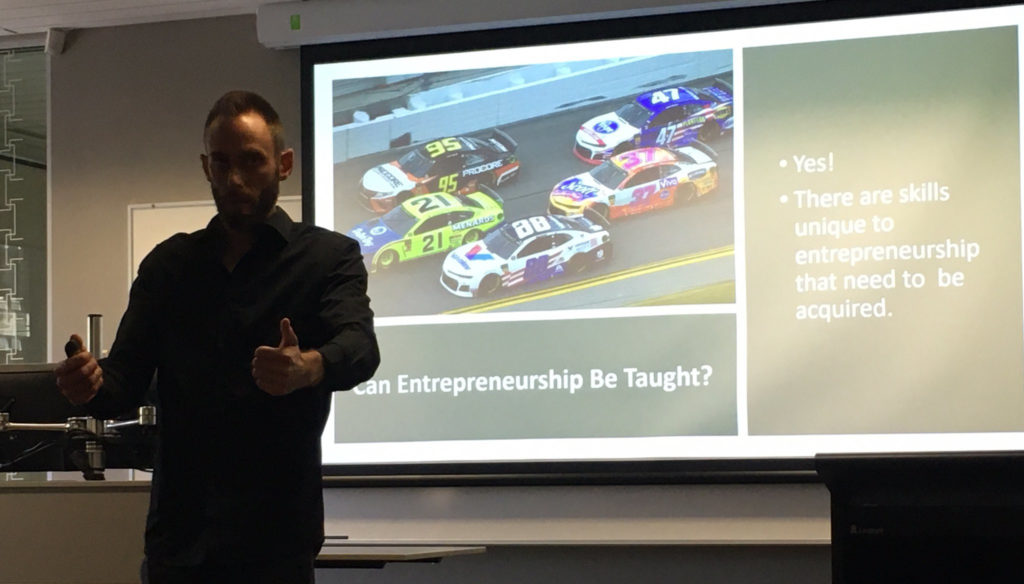
Image: Orren Prunckun sharing insights on teaching entrepreneurship, photo credit Sukanlaya Sawang on Twitter.
Entrepreneurship education is evolving alongside the field of entrepreneurship. There is an increasing need to embed new mindsets in future generations, develop practical learning through programs such as accelerators, and integrate entrepreneur thinking across all curriculums.
The Entrepreneurship Educators’ Forum explored the future of innovation and entrepreneurship in education with sessions including embedding entrepreneur education into secondary school curriculum, advances in micro credentialing, regional impacts from university accelerators, and developing an entrepreneurial mindset for job-seekers of the future.
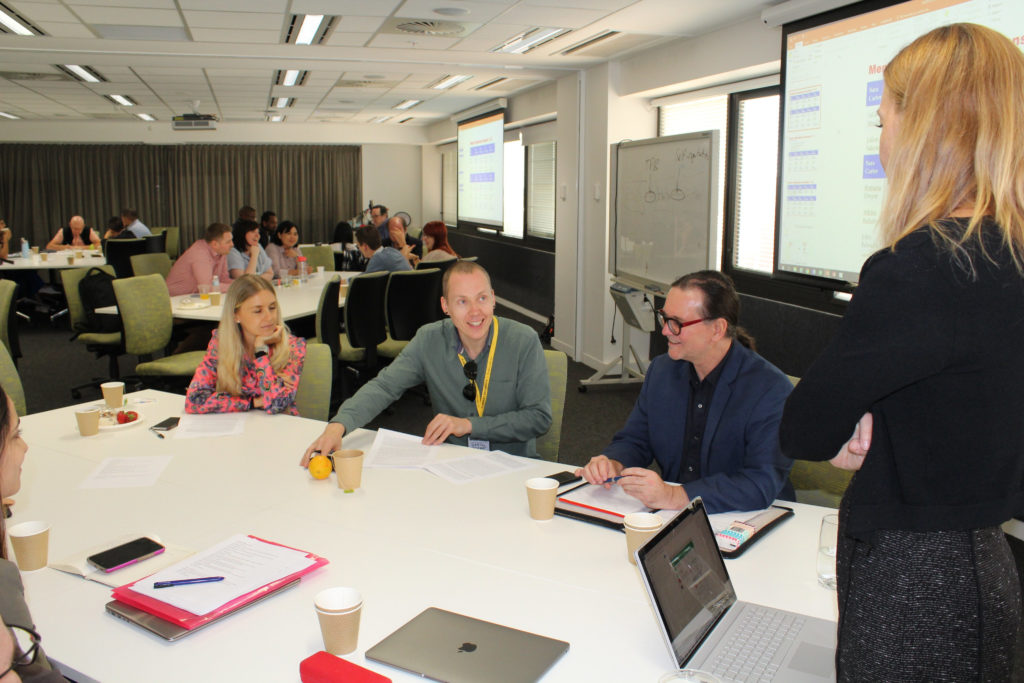
Image: Doctoral candidates receiving feedback from peers and mentors, photo credit Dr. Forough Dazleahi on Twitter.
The advancement of entrepreneurship research is dependent on new researchers entering the field. PhD candidates build on existing research, bringing new perspectives and focusing on specific areas of passion and interest.
The Doctoral Consortium provided doctoral students with the opportunity to present their research and learn from peers and mentors in research. In addition to gaining insights from decades of research, the day provided opportunities for networking and the foundation for future research collaborations.
Paper presentation sessions: Emerging entrepreneur research
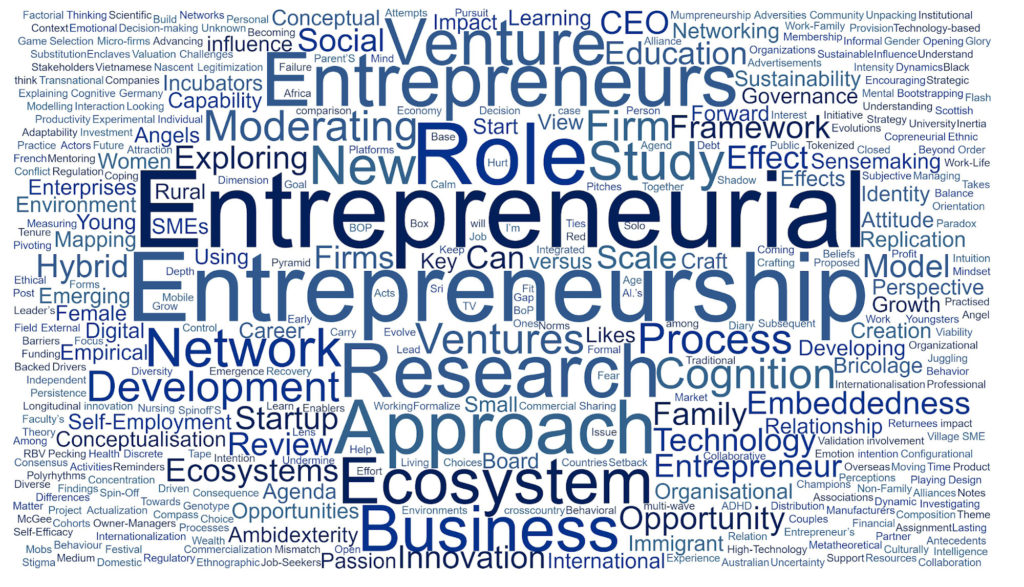
A main focus of the conference is the 80+ presentations on emerging topics of entrepreneurship research. Every facet of entrepreneur activity is considered, including stage of business, type of business, role in the system such as investor or government, the overall ecosystem that supports entrepreneurial activity, the characteristic of the entrepreneur such as gender or nationality, and more.
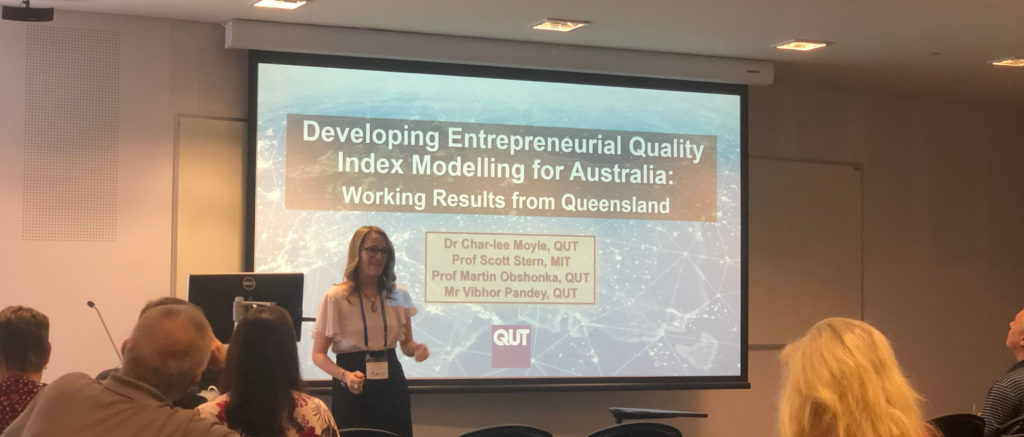
Image: Char-lee Moyle from QUT presenting on Entrepreneurial Quality Index Modelling for Australia
A small sample of the topics include:
- Entrepreneur psychology and cognition (social learning; CEO regulation; entrepreneur actualisation; impact of ADHD; personal identity; personal initiative and impact of pivoting; influence of intuition and passion; self-employment and mental health)
- Venture creation (External enablers; fear of failure influence; role of experience; evolution of startup pitches; new ventures in developing countries)
- Social impact, diversity, and sustainability (Divorced women as entrepreneurs; emotion in ethical decision making; formal networking for female entrepreneurs; gender influence from job advertisements; immigrant entrepreneurs; Buddhist entrepreneurs)
- Entrepreneur education (Designing education programs with limited resources; capability versus self-efficacy; entrepreneur education career impact)
- Ecosystem and geography (angel-investment backed company performance; university spin-offs; ecosystem governance; ecosystem mapping)
- The entrepreneurial firm (CEO celebrity profile impact; role of artificial intelligence; strategies for disrupted industries; family firms)
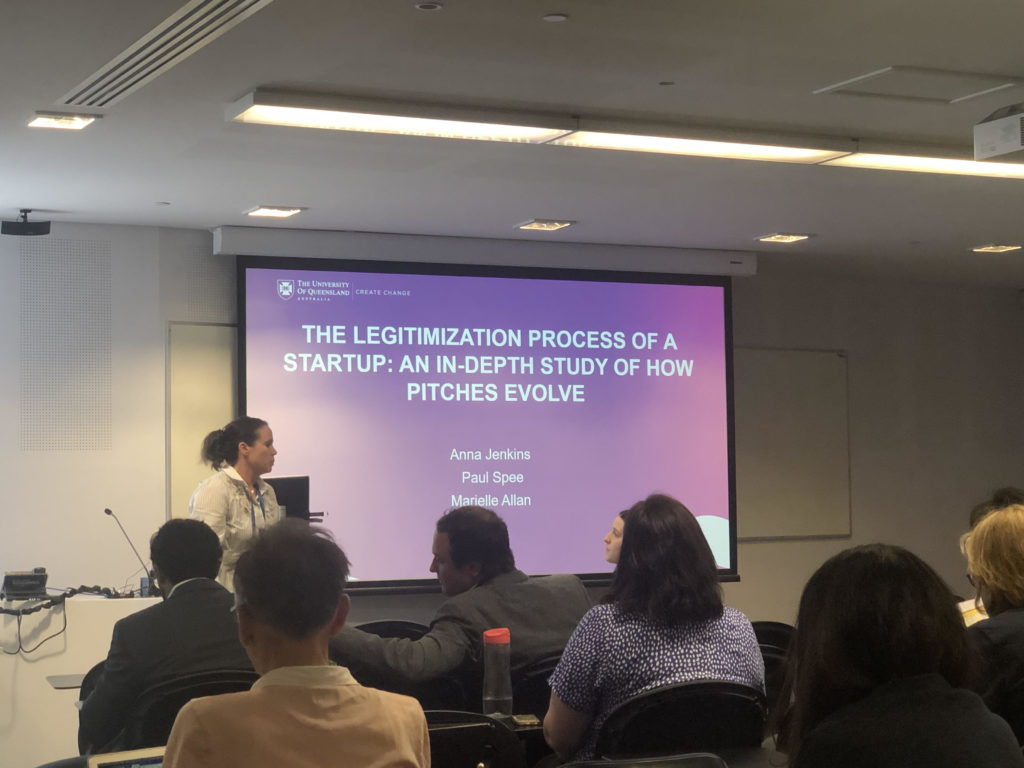
Image: Anna Jenkins from UQ presenting on The Legitimation Process of a Startup: An In-depth Study of How Pitched Evolve
Key messages from three keynotes
Day 1 keynote Dean Shepherd – Adversity and entrepreneurship: A research journey
It’s not research, it’s me-search
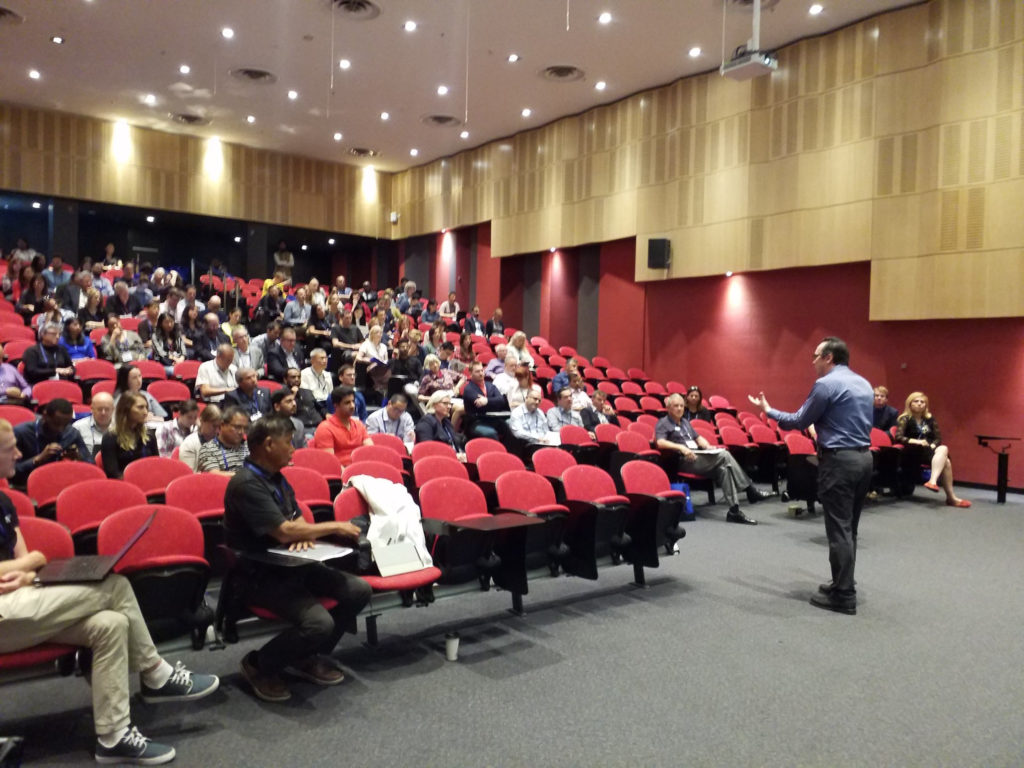
Image: Dean Shepherd presents keynote at ACERE 2020, image credit Allan O’Connor on Twitter
In the opening keynote, Dean Shepherd shared a personal reflection from his long history of research across four main areas of: new ventures, decision making, opportunity, and the dark side of entrepreneurship. An underlying theme of his presentation was the influence of his personal journey on his research, noting that research is as just as much about ‘me-search’:
“We do research about ourselves and what we research reflects us”
Dean shared how the failure of his family’s business – which he spoke about in a previous TedX talk – provided inspiration for using psychology to explain the emotions of business failure for the self-employed and further studies into managing the grief process of entrepreneurship. Entrepreneurship is about the pursuit of opportunity in conditions of high uncertainty and failure is a frequent occurrence. There is a need to support entrepreneurs who make the emotional investments in new ventures to manage the grief process of business failure.
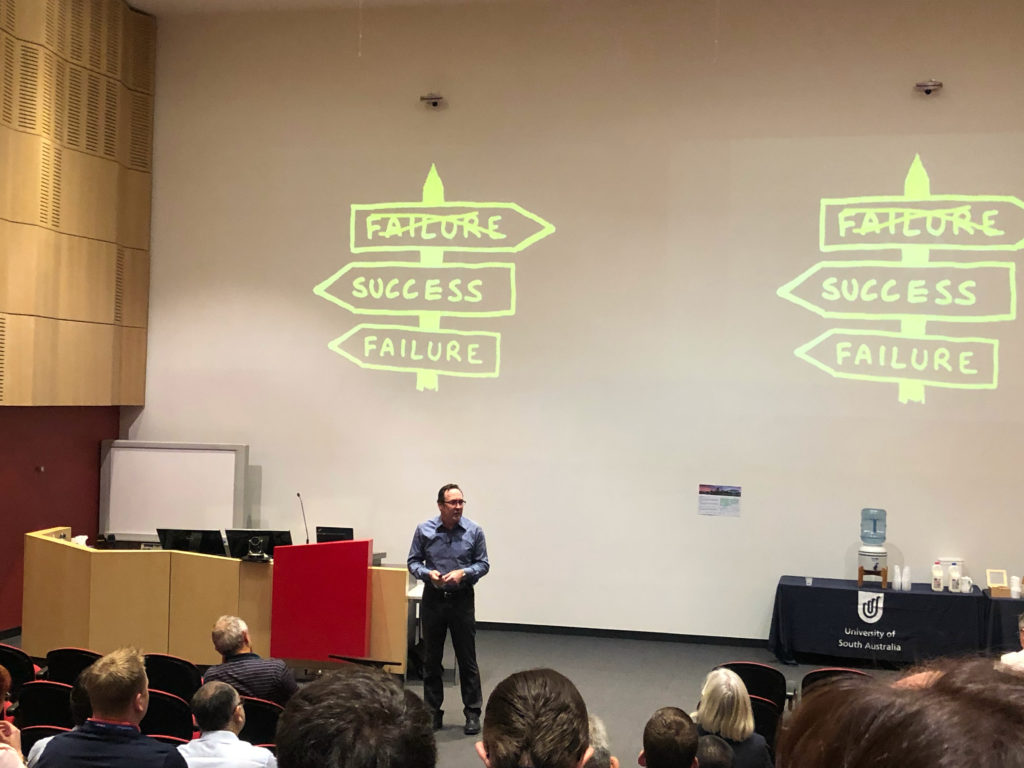
The discussion on grief was followed by a focus on the role that adversity plays in the entrepreneurial process. Convention would say that we are more entrepreneurial when we have slack, or spare time and resources. And yet we also say that necessity is the mother of invention. So which is it? These two seemingly contradicting perspectives were explained by Dean and colleagues in what they described as ‘a double edge sword of slack’ where excess resources can fuel growth but weaken entrepreneurial action.
Dean continued to examine specific examples of entrepreneurship in adversity with examples from his research into entrepreneurship in times of disaster response in Haiti, the value of entrepreneurs for community impact in resource-poor regions of rural India, entrepreneurship identity in Lebanese refugee camps, the role of entrepreneurship in mitigating domestic violence against women in Afghanistan, the emphasis of educating children of entrepreneurs in slums of India to alleviate embedded poverty, and entrepreneurship as a means to recover identity for disabled veterans.
Each of the examples Dean shared could be considered rock bottom, but Dean also highlighted how this provides an opportunity to start something new. On the way down it is bad and there is potential to disengage from reality through drugs and fantasy when you hit the bottom. But also through hitting rock bottom there is potential to start to engage in identity play and develop a clean slate until you find a hat that fits.
Dean’s keynote provided encouragement for those researching to draw on personal experience as a source of inspiration. The examples also highlight the value of entrepreneurship for improving personal wellbeing through taking personal control while also benefiting others. The stories underscored the value of research to help understand how entrepreneurship supports all aspects of community and entrepreneurs at each stage.
Day 2 keynote Sara Carter – Households as a site of entrepreneurial activity
“When we are talking to entrepreneurs, we are not seeing the contextualised decisions based on the household in which they are embedded.”
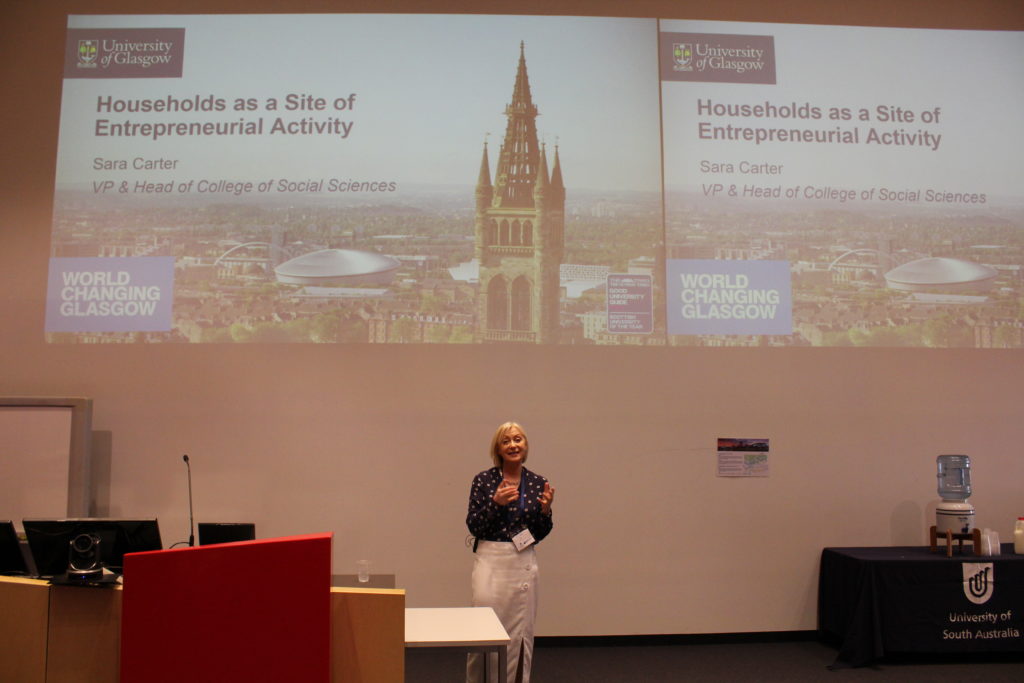
The second day of the conference was opened by Sara Carter from the University of Glasgow who provided a keynote sharing her research into households as a site of entrepreneurial activity. The presentation was personally relatable having grown up in an entrepreneurial family as well as being an entrepreneur in my household as an adult.
Sara shared research showing that economic decision making in firms often starts in the household. Decisions are not always based on economic rationality but on household needs and preferences. Particularly in family businesses, the boundaries blur between business and household decisions. Households become their own economic unit, kitchen tables share similarities with business boardroom tables, family members become human resources, and decisions about family growth are considered in business growth strategies.
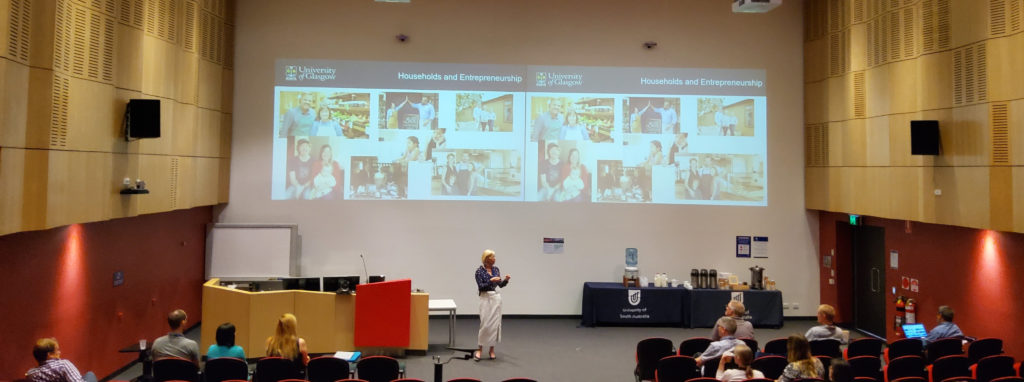
Household economic decision making is particularly interesting when considering that on average women-owned businesses start with one-third less capital than their male counterparts, affecting their performance trajectory. Sara shared a 1995 study from Jan Pahl that outlined ways that wages are distributed across households:
- Female whole wage: Man works outside the house, brings home the money, takes or is given an allowance, and hands the funds to the female who manages the money
- Male whole wage: Man works outside the house, keeps the money, leaving the unemployed female with no money and effectively middle-class poverty
- Household allowance: Separate funds by the male and female are put into a common pool for housekeeping
- Pooling: Complete common pooling of funds
- Independent management: Each party manages completely separate finances, with agreements on who pays what
These considerations are important when working with entrepreneurs. When we are talking to entrepreneurs, we are not seeing the contextualised decisions based on the household in which they are embedded. Decisions relating to growth and risk are inherently associated with the household that acts as both context and its own actor. This is even more pronounced when considering a family business or when the business is run out of the family home or farm.
Policy and programs can at times feel like a one-size-fits-all approach. Even programs that focus on a specific community segments such as female, indigenous, young, or mature entrepreneurs may not account for significantly different household context. Sara’s keynote highlighted an example where more research is needed to better understand and adapt to support entrepreneurs.
Day 3 keynote David B. Audretsch – Democracy & Entrepreneurship
Democracy will not work unless we have a diversity of different views
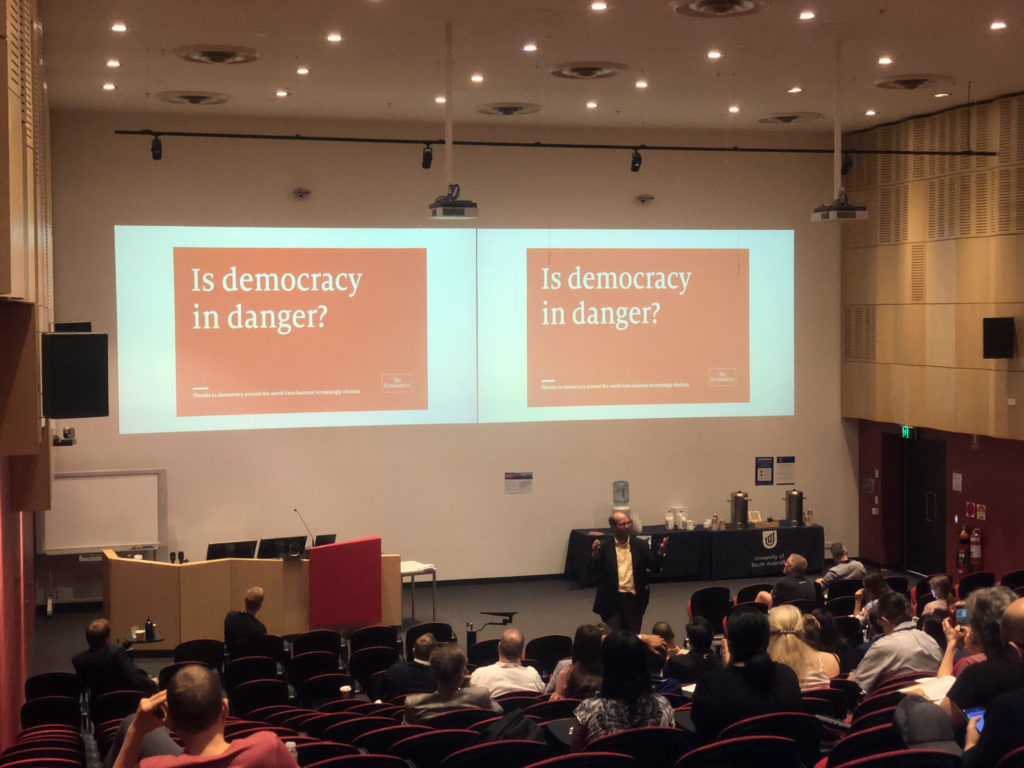
In the keynote on the final day, David Audretsch took delegates on a journey from the first days of entrepreneurship research into the present. Through the process he also raised a potential worrying trend towards a decline in democracy.
David began with reflecting there was a time when there was little interest in entrepreneurship research, much less a focus on startups. This all changed in the 1970s with research by David Birch that showed that four out of five jobs were created by small firms. Entrepreneurship research grew as a response to the jobs focus of the 1970s and pursuit of quality and sustainable jobs in the 1980s.
What leads to performance and success in yesterday’s decades will not be the same for today. Industries that were reliable in the 1970s struggled with increasing technology and globalisation of the 1980s and onwards. In a globalising world, high-cost and high-wage countries need to do something the rest of the world cannot do. Even as jobs faded, there was a new focus on competitive advantage and innovation in the 1990s. The 2000’s saw new themes emerged in entrepreneurship research of social contribution, inclusivity, and representation. This was followed in the 2010’s by an an increase in research on productivity and growth.
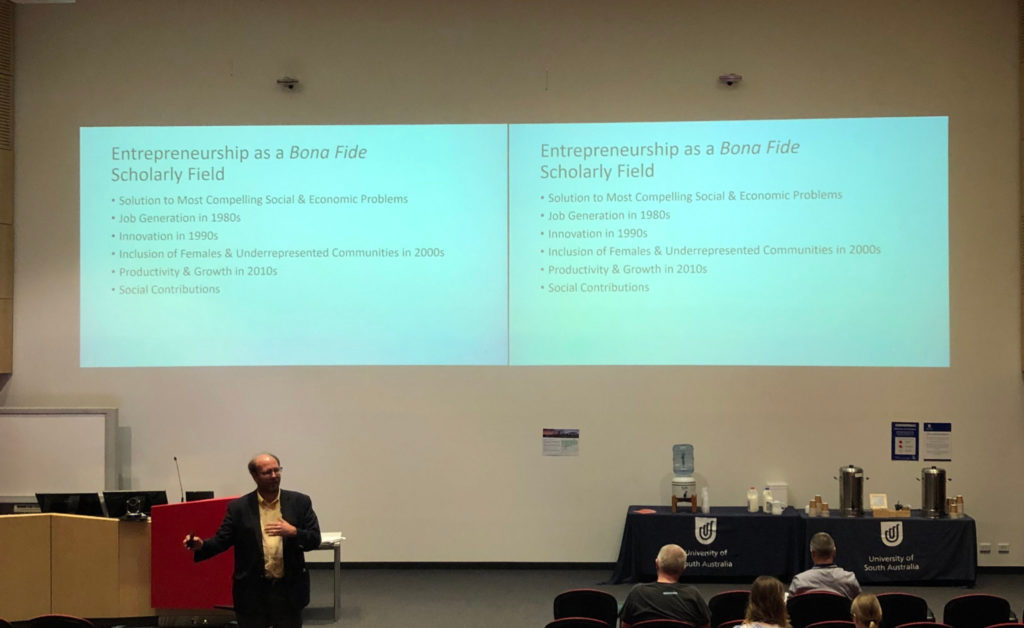
Image: David Audretsch sharing the history of entrepreneurship research, image credit Frederik von Briel on Twitter
David reflected that the field of research has always been driven by addressing the most common problem and challenge of the time. Productivity, innovation, and inclusivity challenges had always been around, but they were not the focus during the jobs crisis of the 1970s. Similarly, David pointed out that among the over 80 papers presented at the conference, none had a specific jobs focus. Several, however, looked at contemporary challenges of diversity, innovation, new markets, and system change.
Which brought the talk to the emerging issue of today of a global decline in entrepreneurship and a corresponding decline in democracy and freedom. David noted research from Freedom House noting the 13th consecutive year of decline in global freedom.
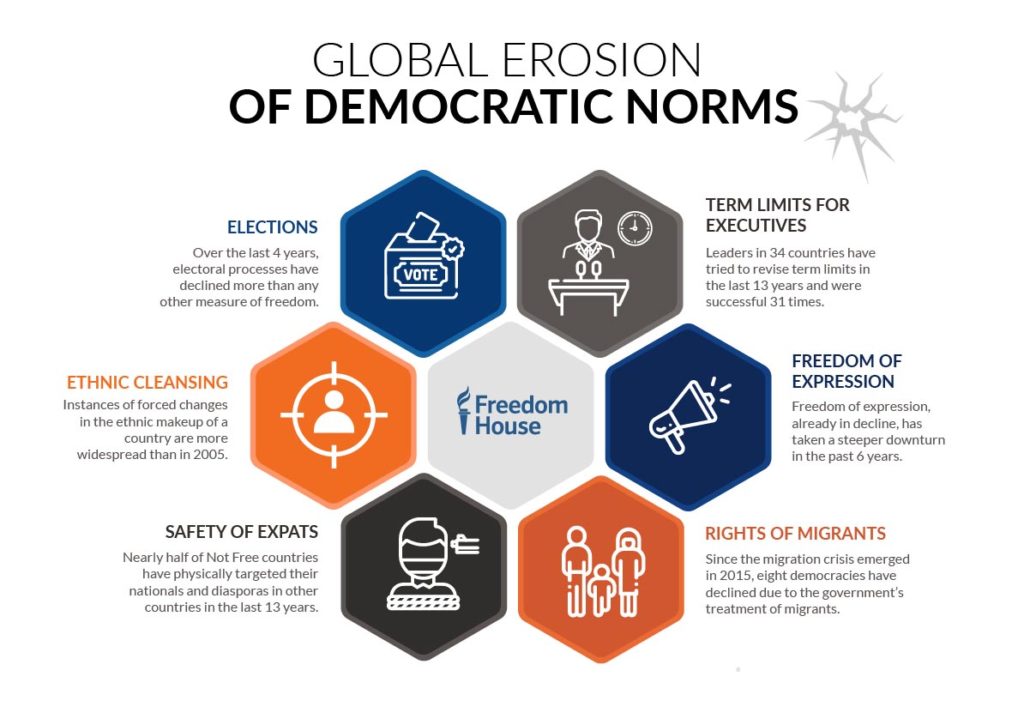
David provided a historical perspective that included the Berlin wall, US monopolies from the 1870s, and Nazi Germany. In each case there was a corresponding drop in new businesses and democracy. There can be a tendency to think that conditions could not revert back to a loss of freedom. And yet a reflection on the time could be just as applicable today: “the big companies and corporations as well as lobbyists acquiesced with the new leaders, and they were keen, due to profit maximisation, to live and work without their entrepreneurial freedom and decision making power,their liberal economic principles as well as their beliefs and opinions.“
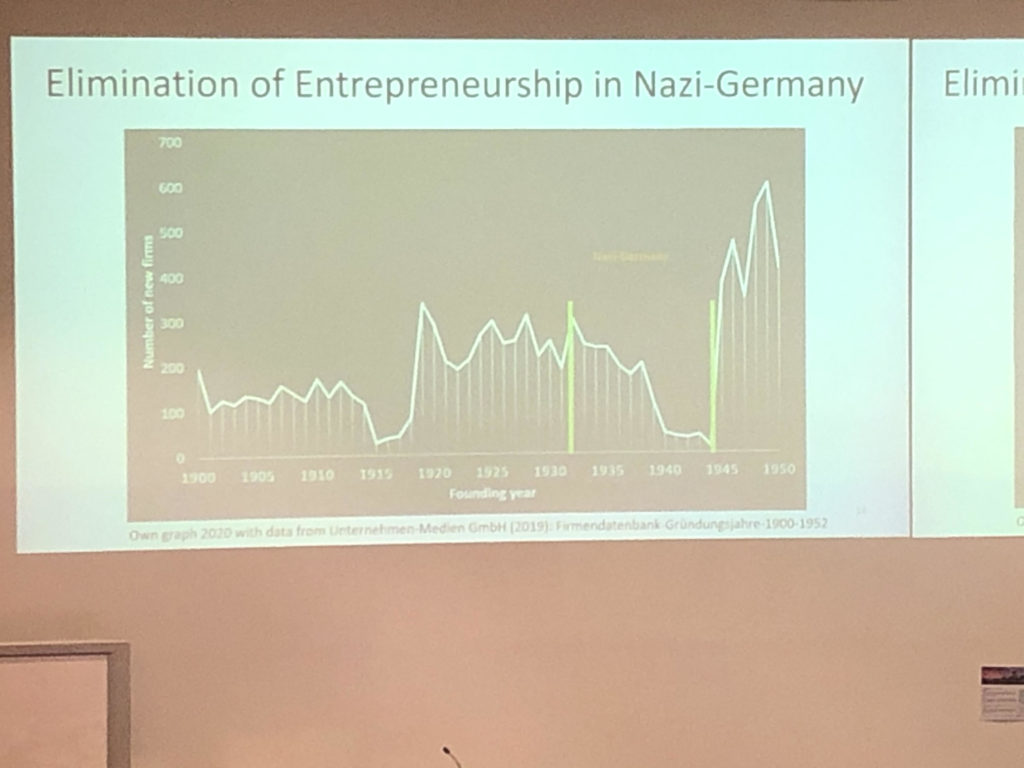
The promise outlined by Francis Fukuyama in The End of History – that western liberal democracy is an inevitable final form of government – is now no longer deemed a certainty. David provided examples of declines in both startups and countries such as Turkey and Hungary. Control is easier to implement when there is not independent thinking. Dissidents are declared enemies who rarely got a second chance and risk losing their business.
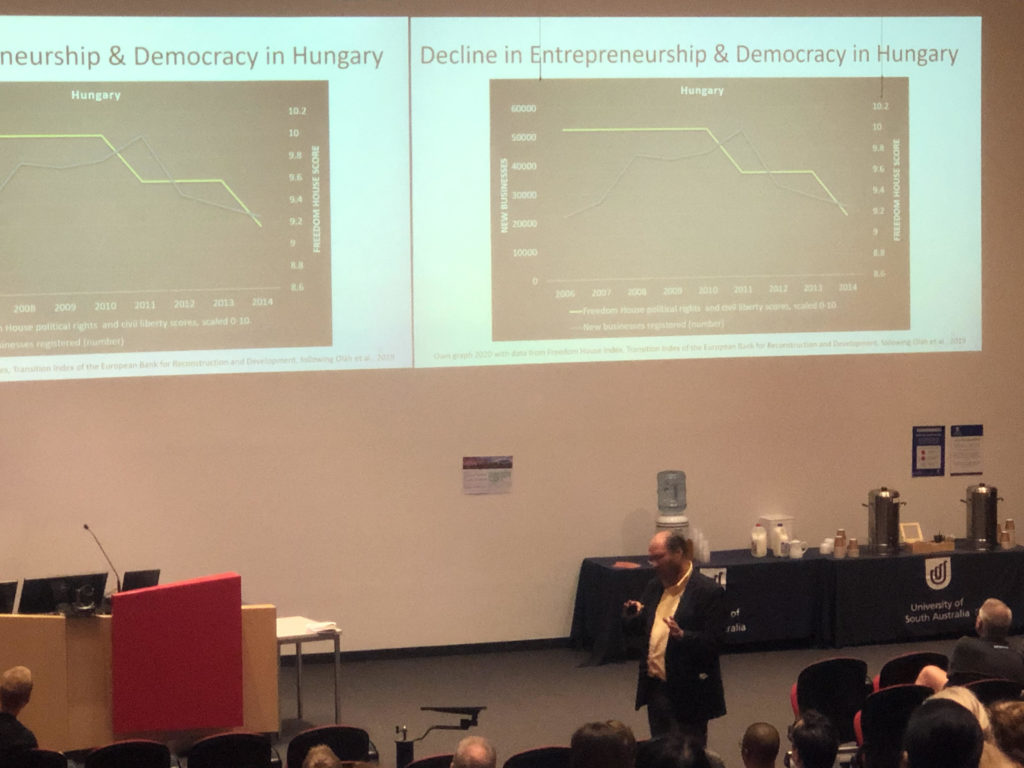
And while this may seem like an issue with non-Western countries, David highlighted research that showed the trend reflected in the US as well. The share of young firms (less than five years old) declined from 47 percent in the late 1980s to 39 percent in 2006. The share of young firms in providing employment has declined by 30 percent since the 1980s. the share of employment with forms more than 250 employees rose from 51 percent to 57 percent and the average form size has increased from 20 to 24 employees.
This pattern of decline in relative entrepreneurship is seen across advanced economies, as shown in a recent paper by Wim Naude. This is reinforced by a pending OECD report following on from previous cross-country startup dynamics analysis showing business entries declining and the age of businesses increasing.
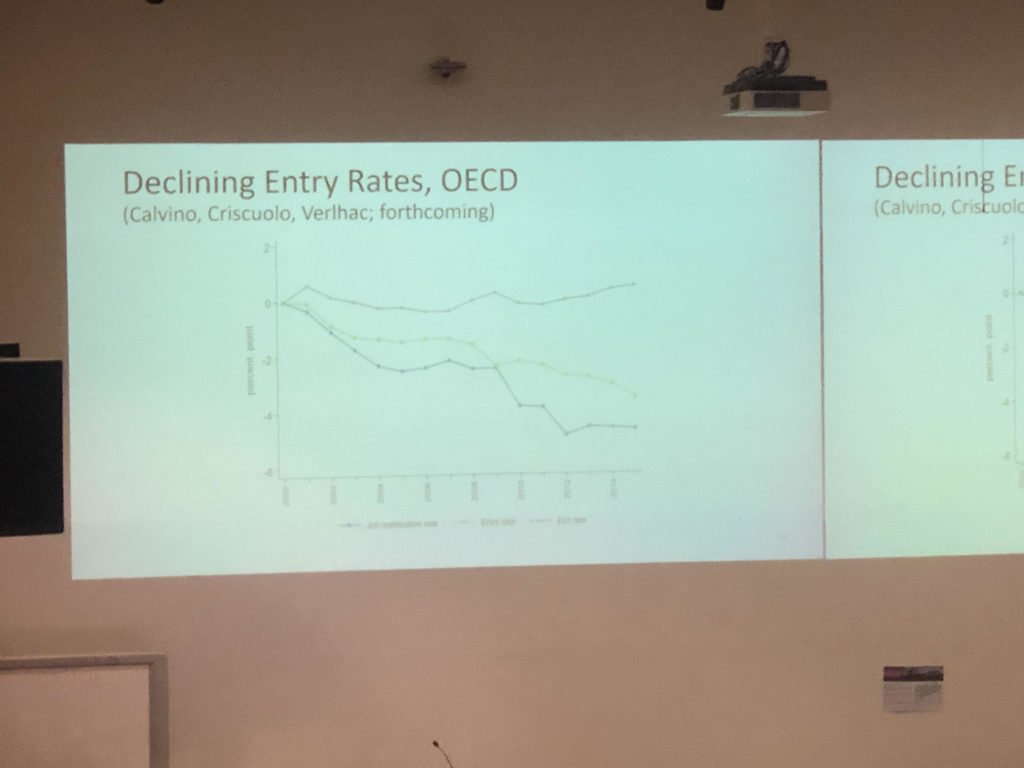
David highlighted how production is becoming more concentrated, freedoms are eroding and startup rates declining. And yet democracy will not work unless we have a diversity of different views. Rather than providing the solution, David’s presentation provided questions and inspiration for future research.
Which way is the causality between declining democracy and declining entrepreneurship? How should we rethink the justification and urgency for entrepreneurship policies? What does this mean for future entrepreneurship research? As the final keynote, David’s presentation was positioned to shape the focus and urgency for the next 12 months until next year’s conference at Bond University on the Gold Coast, Queensland.
Where to from here
When viewed as a whole, the Australian Centre for Entrepreneurship Research Exchange provides a compelling narrative for entrepreneurship research and practice.
Education of entrepreneurs is important to shift the next generation and long-term culture. The investment in future entrepreneurship researchers is just as critical to answer key questions and support both policy makers and program providers.
As Dean’s career reflects, research needs to be driven from personal passion as much as current trends. Those personal passions can also have a significant impact on humanity. Research both personally and socially rewarding.
Entrepreneurship is complex. Sara’s presentation on the influence of household dynamics showed how much we may be taking for granted when developing policy and programs. Research allows us help more people who otherwise might not benefit from entrepreneurship opportunities.
Finally, when considering what’s next, David raised the need to examine the global trend of reduced democracy and entrepreneurship. The challenge is global and shared, providing opportunities – and even a necessity – for greater research collaboration.
Which is the main point of ACERE – to bring researchers together to learn, share, and do more than they could every achieve on their own. The challenges facing the world are complex and it is only through collaboration that they will be addressed. The diversity of research topics, depth of thought, global reach, and individual passions brought together over four days at ACERE is encouraging for the future of entrepreneurship research and practice.
If you attended the conference, I would be keen for your thoughts. If you were unable to attend and would like more information, feel free to connect with me or sign up for the newsletter at the ACERE website. Connection and collaboration with like-minded leaders is always welcome.
